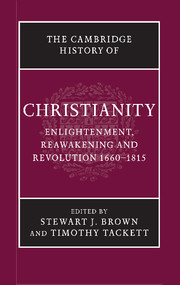Book contents
- Frontmatter
- Introduction
- PART I CHURCH, STATE, AND SOCIETY IN THE EUROPEAN WORLD, 1660–1780
- PART II CHRISTIAN LIFE IN THE EUROPEAN WORLD, 1660–1780
- PART III MOVEMENTS AND CHALLENGES
- PART IV CHRISTIAN DEVELOPMENTS IN THE NON-EUROPEAN WORLD
- 19 Christianity in Iberian America
- 20 British and French North America to 1765
- 21 Christianity in Africa
- 22 Christianity in south and south-east Asia
- 23 Christianity in East Asia
- 24 Christian encounters with other world religions
- PART V REVOLUTION AND THE CHRISTIAN WORLD
- Chronology
- Bibliography
- Index
- References
21 - Christianity in Africa
from PART IV - CHRISTIAN DEVELOPMENTS IN THE NON-EUROPEAN WORLD
Published online by Cambridge University Press: 28 March 2008
- Frontmatter
- Introduction
- PART I CHURCH, STATE, AND SOCIETY IN THE EUROPEAN WORLD, 1660–1780
- PART II CHRISTIAN LIFE IN THE EUROPEAN WORLD, 1660–1780
- PART III MOVEMENTS AND CHALLENGES
- PART IV CHRISTIAN DEVELOPMENTS IN THE NON-EUROPEAN WORLD
- 19 Christianity in Iberian America
- 20 British and French North America to 1765
- 21 Christianity in Africa
- 22 Christianity in south and south-east Asia
- 23 Christianity in East Asia
- 24 Christian encounters with other world religions
- PART V REVOLUTION AND THE CHRISTIAN WORLD
- Chronology
- Bibliography
- Index
- References
Summary
Led by Catholic Spain and Portugal, and later joined by Protestant England and the Netherlands, the explosion of maritime exploration from the late fifteenth century made for a shift from land-based power to sea-based power. In the era before Vasco da Gama rounded the Cape in 1498, the dominant world powers had been land-based. After 1500, the dominant powers were those with unchallenged suzerainty over the sea lanes, from Lisbon and Genoa, or Plymouth and Rotterdam, to Goa and Canton. Sea-based power brought into play a new mercantile class whose entrepreneurial spirit sent them looking for wealth and profit in hitherto unknown or unexplored lands. As one such adventurer expressed it, they crossed the seas ‘to serve God and His majesty, to give light to those who were in darkness’, but also most emphatically ‘to grow rich, as all men desire to do’. Or, as Columbus expressed it, ‘Gold, what an excellent product! It is from gold that riches come. He who has gold can do whatever he pleases in this world. With gold one can even bring souls into Paradise.’ For these entrepreneurs, mission was not just necessary, it was profitable.
The Catholic missions in West and East Africa
The first European sea-based power to colonize extensively in Africa was Portugal, a small monarchy that had arisen amid the twelfth-century Christian crusade against the Moors in the Iberian peninsula. Seeking gold and slaves, and perhaps the fabled Christian kingdom of Prester John, fifteenth-century Portuguese kings sent expedition after expedition to sail ever further southwards along the western African coast.
- Type
- Chapter
- Information
- The Cambridge History of Christianity , pp. 411 - 432Publisher: Cambridge University PressPrint publication year: 2006
References
- 1
- Cited by

